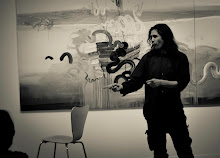I am currently working on a performance piece for next week, and it will serve well as an example of how one works up ideas or books into performance.
First and foremost is something rather obvious: One actually has to have something interesting to say. Moreover this idea must resonate with the audience. There is no point then in having an abstract idea that is too complex to explain, nor yet to simply learn and then repeat the words of the philosopher with no effort to show how and when and why they matter. But this does not mean of course that one cannot perform abstract ideas, and I certainly rework all the thinkers I perform. I perform 'my' version of them, as a philosopher. Nor can one as a performance philosopher ever forget the texts one is performing. It is just that onto these facets of 'straight' philosophy are grafted the need to keep words and ideas engaging and provocative: An exercise in exegesis that I actually find stimulating. If I can explain an idea to a mixed audience (in age/experience of philosophy from lots to virtually none) engage some of them, and keep the subtlety of the original, then I think the idea is really worth something.
Hence I only perform new pieces when I have something actually new to say. For example, next week I am performing Marx, a philosopher from whom I have developed performance pieces before. The question is therefore what do you have new to say? My previous pieces being a summary of the very important chapter on the machine from Das Capital (http://youtu.be/AtNuvR4bBhY), and the very famous opening bars of the eighteenth Brumaire of Louis Napoleon (http://youtu.be/Eq7TySBsgq0). What I have not done, is a classic overview of Marx, the kind of one that I gave in my university lecturing days. But the game then is exactly how does one translate the lecture hall into the music hall?
This leads to the second main aspect of performing philosophy - it is an awful a lot about finding the right voice for the thinker. Most critical here is the person or character one performs in. I usually think stand up thought ought to have a little bit of first person performance, so that there ought to be a moment when one is being the thinker in question, and yet one does not need to be doing that solely. Additionally even if one is being the thinker, one has to decide exactly how one is being so. That is in what manner or aspect are they present? Are they before an audience as the writer of their work, or as a modern commentator with the benefit of hindsight, and even later scholarship? And if the former, exactly what part of the original are they going to highlight and develop, what part is haunting them and requiring them to write? Alternatively, are they actually haunting us through their work? And if so how is that ghost manifest? Likewise if they are simply present, then what are they going to say? Why have they come back? In what sense are they looking at us, and wanting to speak? Alternatively if one is keeping them in part in the third person, then why are you doing so? And even more importantly how does that distancing attempt to control the thinker or their work. and how does the idea of that philosopher actually strain at this third person element? Could they break free? In short perhaps, this is the point at which one finds the edge of the thought.
In the current piece I am working on, I started with this last option, trying to explain and contain Marx; But he broke free from the containment, and in my mind at least clearly wanted to speak for himself, and had a lot to say. For how could he not be fascinated and repelled by all the history that lies in the one hundred and thirty years since he died? Or how can he not comment on current affairs, and his interpretation of them? The strength of the piece will revolve around how this 'having Marx in the room,' element works. Here one must be as faithful as one can. Marx is a challenging and volcanic thinker, with a pragmatic eye, an ability to overturn dogma (even his own) and an ability to re-work current affairs, and to allow one to understand them anew or askance. But at the same time, he is prone to self-justification, and to an entrenchment of his own views in the face of what he feels to be criticism, or even worse, misuse of his ideas. He has therefore an awful lot to say about recent history. The trick of the performance will be getting this voice right. That is, getting the right amount of self -justification, blended with re-analysis of the political situation, and subtle re-interpretation of his own ideas and approach in the face of what subsequently happened. Central to the performance is therefore Marx's account of why things did not work out as he thought they would, and its climax lies in his relationship with what that might mean, and his posing it as a problem for the audience.
The style of this piece is in a sense my homage less to Marx and more to Nietzsche. For it was Nietzsche who first realised, and exploited the real power of the 'confessions' of philosophers. Nietzsche's Zarathustra draws upon all the freedom of the first advocate to re-think morality, and re-work humanity, a realisation that will then catch us all up in it. It is this ability of the original to re-think what followed that I will draw upon in this piece, and the performance will stand or fall by how convincing then the confessional element of a great thinker truly is, or not.


No comments:
Post a Comment